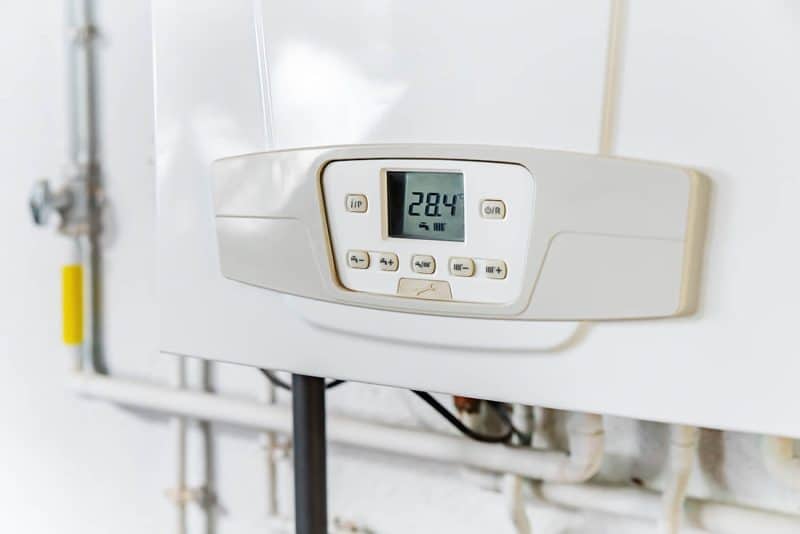Boilers, Hot Water Heaters and How They Work
When most people think of a heater, a reliable furnace is probably the first thing you think of. But plumbing appliances like your hot water heater and even boilers are just as beneficial. Your hot water heater helps with tasks like cooking and cleaning, while boilers can be efficient solutions for residential heating. With a professional team of installers and service technicians, UGI Heating, Cooling & Plumbing can help make the most of these appliances.
Let’s find out how these two systems work. You can make a well-informed decision when it’s time to schedule boiler installation of your own. And when you need any sort of boiler repair, give us a call at 833-980-3496.
How Does Home Heating with a Boiler Work?
While furnaces are often the go-to heating system these days, boilers are commonly used options too. You can still find them in older homes by way of standing or baseboard radiators. Today, boilers are making a return thanks to design innovations.
When the temperature falls beneath your desired settings, the boiler starts heating water for distribution throughout the house. Various zone valves direct the water to each radiator using a efficient circulating pump. But now, boilers can also work with modern HVAC ductwork. A hot water coil is installed inside the air ducts, heating the air by convection before it flows through the rest of the ductwork.
Most boilers maintain the water’s temperature between 180 to 200 degrees (F). To keep the entire supply at optimal temperatures, the circulator will keep pumping water until the coldest water has returned to the system. Maintaining the pressure of this system is best at around 30 pounds per square inch (psi). A gauge located on the front of the boiler allows you to monitor both the pressure and the water’s temperature.
Other vital components include the air scoop, water feeder, expansion tank and relief valve:
- The air scoop, also referred to as an air separator or air purge, clears out the air bubbles suspended in the water. Removing the air reduces noise and stops air-bound radiation from affecting the system’s efficiency.
- Automatic water feeders continuously add water when needed to keep the system full, reducing the risk of issues.
- The expansion tank removes and stores excess water generated during the heating process.
- Lastly, the boiler’s relief valve maintains the water pressure at safe/efficient levels. Otherwise, you risk overheating the system or overloading it with water.
Contact Us Now Or Call 833-980-3496
First Up: How Do Conventional Water Heaters Work?
In general, a hot water heater is comprised of a large storage tank with electric or natural gas heating elements. Water stored inside the tank is continuously heated until you need it. The water is heated to your desired temperature before being sent to the faucet or appliance that needs it. For safety and efficiency, the water heater’s thermostat should stay around 120°F and 140°F. This lowers the risk of scalding or bacterial growth.
In contrast, tankless water heaters are comparatively new and don’t use a storage tank, as the name suggests. Instead, it heats water as it arrives from the water main. This can be very energy-efficient since you don’t need to constantly heat water like you would with a conventional tank water heater.
Five Signs Your Boiler May Need Professional Service
Contact a qualified boiler repair specialist if you recognize any of the following signs:
1
The burner is noisy or emits a smoky odor:
These burner problems often point back to trouble with the combustion process. Your technican should inspect the burner assembly itself as well as the air and fuel supply lines.
Excessive air noises:
A loud boiler can be explained by air trapped somewhere in the system, affecting efficiency. While most of the time the pockets of air are found in the pipes, there could also be an issue with the circulation pump.
2
3
Water leaking from the relief valve:
In most cases this is a sign that the water pressure inside your boiler is too high. This may be a problem with the valve itself or a faulty expansion tank.
Water leaking from any of the piping connections:
Leaks at the piping connections are most likely because of damaged seals, joints or connections in the system. Sealing up these leaks early prevents more damage or loss of efficiency.
4
5
A smoky or odor like gas:
The odor of natural gas or something burning is a concerning sign. There may be a leak in the fuel supply line or damage to the burner assembly. A fast response ensures safety and prevents the risk of a fire.

Whether you’re looking to address a problem or you’re considering an upgrade, UGI Heating, Cooling & Plumbing can help.
We can provide quality repair and installation services for both hot water heaters and boilers, and our seasoned staff will do whatever they can to keep these appliances in the best possible shape. Get in touch with us at 833-980-3496 to learn more.
We service all makes and models, so contact us today!
Save Even More with Special Offers
A complete sense of comfort shouldn’t be out of anyone’s budget. UGI Heating, Cooling & Plumbing lightens the load with seasonal promotions, discounts and other special offers. These offers help lower costs for key services, new equipment or whatever else you need for your comfort and peace of mind. Check out our current offers for more details on how to save.
Committed to Comfort from the Very Start
While a long history of service is impressive, nothing is more important to customer satisfaction than a dedication to total comfort. UGI Heating, Cooling & Plumbing considers your peace of mind our top priority, and that hasn’t changed since we first opened our doors. Learn more about our history, and how our communities support us just as much as we support you.